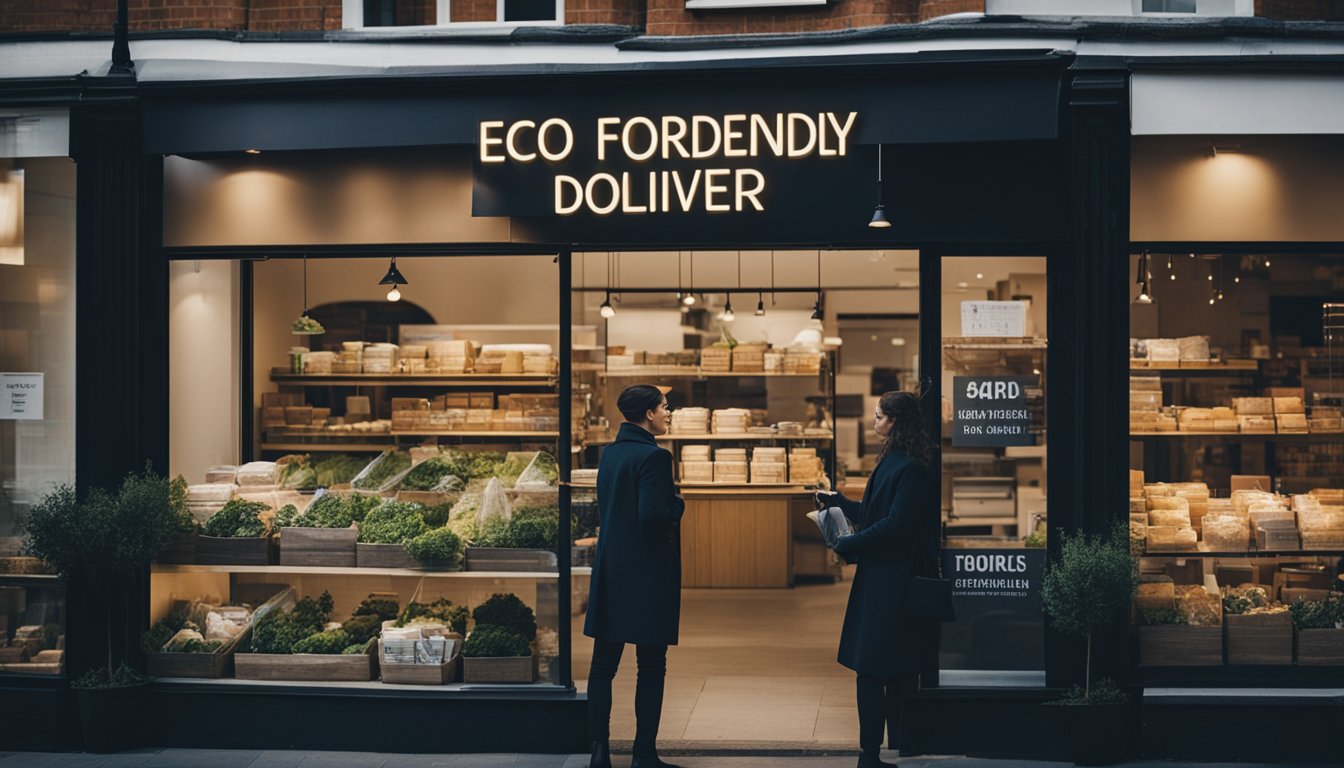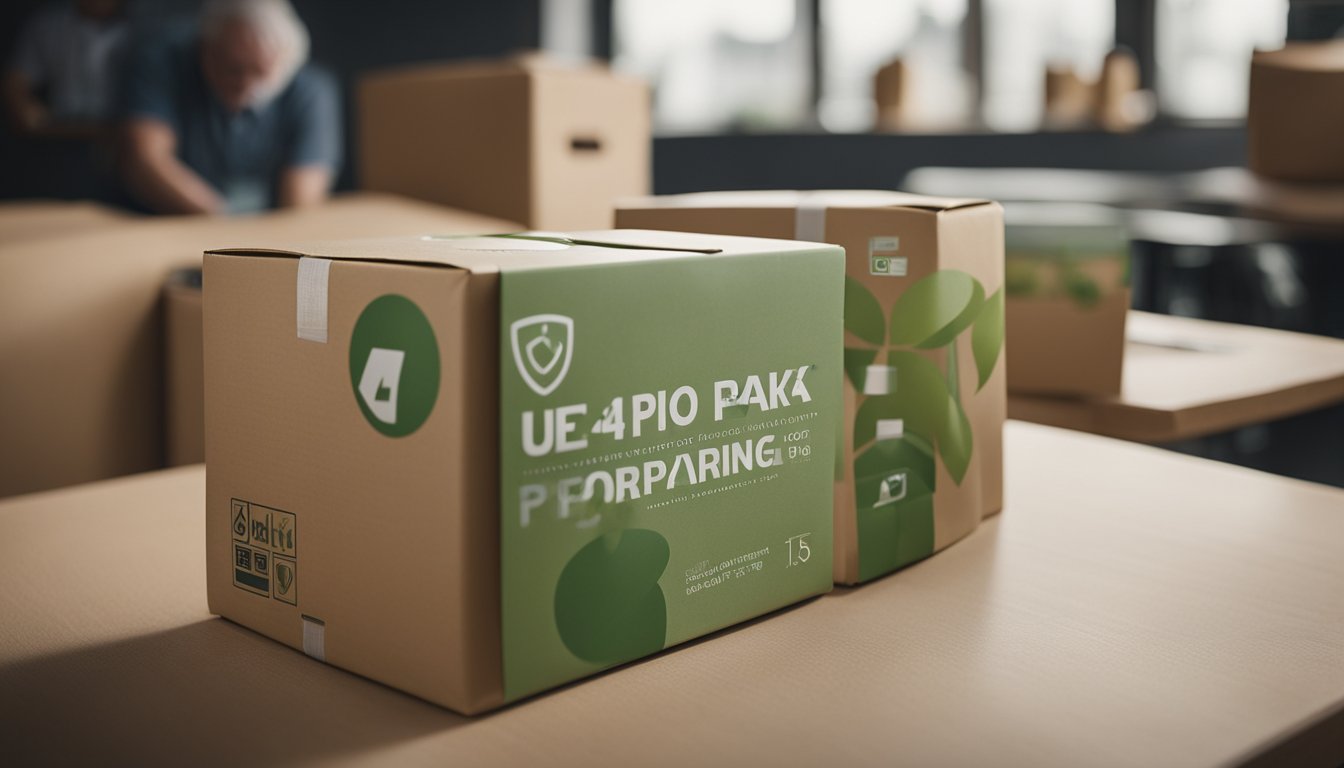Late updated: 01 Jan 2025 10:01
Written by: Amber Collins
Eco-Friendly Deliveries For UK Small Businesses: Optimising Sustainable Practices
As small businesses across the UK strive to meet the growing demand for sustainable practices, eco-friendly deliveries have become a focal point. Consumers are increasingly drawn to brands that prioritise the environment, and for small companies, adopting green logistics not only enhances their reputation but also provides a competitive edge. By integrating eco-friendly delivery solutions, we can significantly reduce our carbon footprint and contribute positively to the environment, all while resonating with eco-conscious consumers.

Adopting sustainable delivery practices often involves more than just choosing the right vehicles. Smaller changes, such as optimising delivery routes and using recyclable packaging, can also have a significant impact. By making these adjustments, small businesses can not only reduce emissions but also operate more efficiently, supporting both business growth and environmental goals.
As we explore the avenues available for eco-friendly logistics, it’s evident that the combination of innovative technology and a commitment to sustainability can lead to substantial benefits. These strategies are not just about preserving the planet; they offer tangible benefits to businesses seeking to thrive in a green-minded market.
Key Takeaways
- Eco-friendly deliveries reduce carbon footprints significantly.
- Sustainable practices drive brand reputation and competitiveness.
- Simple adjustments in operations can enhance environmental impact.
Sustainable Delivery Solutions for Small Businesses
Small businesses in the UK have a range of options available to reduce their environmental footprint in their delivery operations. By adopting sustainable practices like electric vehicles and green logistics, firms can help decrease carbon emissions and move towards a more sustainable future.
Electric Vehicles and Carbon Emissions
Electric vans are a viable option for small businesses aiming to reduce carbon emissions in their delivery systems. These vehicles produce zero emissions, making them an eco-friendly choice for urban and last-mile delivery.
Many companies, including DPD and Royal Mail, have started incorporating electric vehicles into their fleets. Electric vehicles come with benefits such as lower operating costs and reduced environmental impact. As the UK moves toward a net zero goal by 2050, using electric vehicles becomes not only feasible but necessary.
Investing in electric delivery vehicles can significantly reduce a company's carbon footprint. Using a carbon calculator, businesses can track their emissions and strategize more effectively for future reductions.
Innovating with Green Logistics
Green logistics offers innovative solutions for sustainable delivery, involving methods from energy-efficient supply chain management to utilising recyclable packaging. Companies like DHL lead by example, implementing comprehensive green logistics strategies to promote reduced carbon emissions.
These strategies include real-time tracking to optimise routes and decrease unnecessary fuel consumption. Businesses can also consider low-carbon deliveries using renewable energy sources.
Smaller changes, like switching to recyclable packaging, are simple yet impactful. Emphasising eco-friendly practices in logistics aligns with stronger environmental policies, encouraging more significant industry-wide shifts.
The Role of Courier Services in Green Delivery
Courier services are crucial in the eco-friendly delivery landscape. With options like same day courier services, there's an increasing shift towards green courier models, focusing on low carbon emissions and efficient dispatch.
Firms such as Hermes UK commit to reducing their ecological footprint by setting ambitious targets for cleaner operations. These services are vital in achieving environmentally responsible deliveries without sacrificing efficiency.
With the rise of environmentally conscious consumer bases, adopting green courier options can set businesses apart. Integrating green delivery solutions ensures businesses remain competitive, responsive, and aligned with global sustainability goals.
Eco-Friendly Packaging and Operations

Adopting eco-friendly practices in packaging and delivery operations is essential for small businesses committed to sustainability. These approaches not only help reduce environmental impact but also often lead to cost efficiencies and improved brand image.
Choosing Sustainable Packaging Options
When selecting packaging, sustainability should be our guiding principle. Switching to materials like paper, cardboard, and bioplastics can significantly cut down waste. These materials are not only recyclable but also compostable in many cases.
We can also explore packaging solutions that utilise recycled content, reducing the need for virgin materials. Companies should consider eco-friendly options for every part of their packaging, including fillers and tape. By prioritising sustainable packaging, small businesses can play an active role in reducing landfill waste and greenhouse gas emissions.
Implementing Renewable Energy Sources
Integrating renewable energy sources into our operations is a formidable strategy for improving our environmental footprint. Solar panels can be a viable option for warehouses, providing a sustainable way to power facilities. Additionally, sourcing energy through renewable contracts lowers dependency on fossil fuels.
Green energy tariffs offer another method to ensure our electricity comes from renewable sources. By switching to renewable energy, businesses can significantly reduce their carbon emissions and contribute to cleaner air.
Reducing Air Pollution with Alternative Delivery Methods
Air pollution remains a pressing issue in urban areas, but alternative delivery methods can be part of the solution. Utilising vehicles powered by biofuels, or even sustainable aviation fuel for longer distances, can reduce emissions. For local deliveries, joining a cargo bike delivery network or employing electric vehicles like scooters cuts down on air pollution.
These methods not only help to reduce our carbon footprint but also align with governmental initiatives promoting sustainable transport solutions. By focusing on alternative delivery methods, we can minimise our contribution to air pollution while maintaining efficient distribution channels.
Frequently Asked Questions

Our focus here is to address common queries about implementing eco-friendly delivery solutions for small businesses in the UK. These answers delve into sustainable choices, couriers, carbon offset programmes, and incentives available to businesses.
How can small businesses in the UK choose the most sustainable delivery options?
Small businesses should consider electric vehicles, e-cargo bikes, and eco-friendly packaging. These options offer reduced emissions and lower environmental impact. Evaluating the logistics network for efficient routes and using technology for optimised delivery can further enhance sustainability.
What are the leading eco-friendly courier services available for UK small businesses?
Prominent eco-friendly courier services in the UK include DHL and ShipBob, known for their sustainable practices and carbon offset initiatives. These services offer a variety of green delivery solutions tailored to meet the unique needs of small businesses.
In what ways can UK small businesses reduce their carbon footprint with green delivery methods?
Businesses can reduce their carbon footprint by adopting renewable energy sources such as solar panels and switching to LED lighting in warehouses. Utilising delivery software tools that track and optimise carbon emissions can also help in monitoring and reducing their impact on the environment.
Which companies offer carbon offset programmes for deliveries in the UK?
Companies such as ShipBob and Ecocart provide carbon offset programmes designed for deliveries. By partnering with these firms, small businesses can neutralise their carbon output, contributing to a cleaner environment through investment in carbon-reduction projects.
What practices do the top-rated eco-friendly delivery services in the UK follow to ensure sustainability?
Top-rated services often use renewable energy, maintain a fleet of electric vehicles, and engage in reforestation projects. They also participate in circular economy initiatives by promoting reusable packaging and implementing efficient logistics strategies to minimise waste and fuel consumption.
Are there any incentives for UK small businesses to switch to eco-friendly delivery services?
Incentives for small businesses include tax benefits, grants, and subsidies for adopting green technologies. Additionally, switching to eco-friendly delivery services can enhance brand reputation and customer loyalty, as consumers increasingly prefer businesses that prioritise environmental sustainability.
